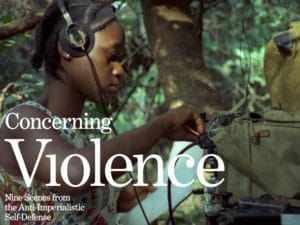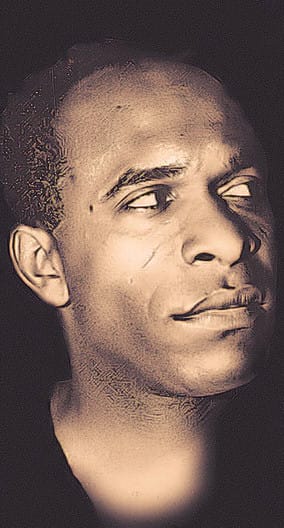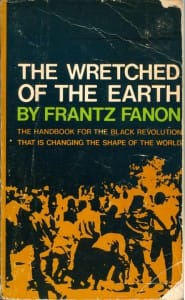Review by The People’s Minister of Information JR
Frantz Fanon was one of the greatest political scientists, writers and philosophers to live in the modern era and deal with the effects of colonialism on the oppressor and the oppressed. Born in 1925 on the island of Martinique, this psychiatrist by trade was hired by the colonial French government in the ‘50s to study the rebelling Algerian subjects so that they could be given the most limited amount of reforms that they would tolerate to quench their newly erupting thirst for progress in the society and freedom.

Frantz Fanon finished “Wretched of the Earth” 10 weeks prior to his death at the age of 36, in 1961. “Wretched of the Earth” was published on the week he died from acute leukemia, and the book was confiscated and banned in France on the very same day that he transitioned.
Some refer to Fanon as a champion of revolutionary violence, which I don’t disagree with, but it must be stated that his works talk about the oppressed being reduced to violence, because, as Malcolm X, a student of Fanon’s work, stated, that is the only language that the oppressor understands from the oppressed.
“Concerning Violence” is a documentary film that reflects on the text of Fanon’s most definitive work, “Wretched of the Earth,” against the backdrop of raw footage from a number of African countries during their revolutionary struggles for independence in the ‘60s, ‘70s and ‘80s and interviews with revolutionaries and colonialists alike about their thoughts on the use of violence to protect their interests. This very important film is directed by Goran Hugo Olsson and is narrated by Ms. Lauryn Hill, the internationally known rapper and singer. The text comes from Fanon’s “Wretched of the Earth.”
“Colonialism is not a thinking machine, nor a body with reasoning faculties. It is violence, in its natural state, and it will only yield when confronted with greater violence,” wrote Fanon. “National liberation, national renaissance, the restoration of nationhood to the people, whatever may be the headings used or the new formulas introduced, decolonization is always a violent phenomenon. Decolonization is a historical process. It cannot be understood; it cannot become clear to itself except by the movements which give it historical form and content. Decolonization which sets out to change the order of the world is obviously a program of complete disorder. But it cannot come as a result of magical practices, nor of natural shock, nor of a friendly understanding.”
The first country that is tackled in “Concerning Violence” is Angola in the year 1974, in the mist of its revolutionary struggle for independence. Some of the footage shows MPLA forces attacking a Portuguese base from the surrounding forest.

“You do not turn any society, however primitive it may be, upside down with such a program if you have not decided from the very beginning to overcome all of the obstacles that you will come across in so doing. The native who decides to put the program into practice and to become its moving force,” narrates Lauryn Hill, “is ready for violence at all times. From birth, it is clear to him that this narrow world strewn with prohibition can only be called in question by absolute violence.”
Frantz Fanon is further quoted as saying: “Decolonization is the meeting of two forces, opposed to each other by their very nature. Their first encounter was marked by violence, and their existence together, that is to say the exploitation of the native by the settler, was carried on by a great array of bayonets and canons.”
The amount of detail that is included in Fanon’s analysis is phenomenal as is his precision and scientific understanding, and it relates to today, whether he is writing about the actions of the oppressor as a political, economic and military machine or the psychology and mentality of the slave masters as well as those subjected to domination, originally against their will.
“The settler makes history; his life is an epic, an odyssey. He is the absolute beginning, ‘This land was created by us.’ He is the unceasing cause, ‘If we leave, all is lost and the country will go back into the Middle Ages.’ And all the while the native bent double, more dead than alive, exists interminably in an unchanging dream. The native is boxed in a corner. Apartheid is simply one form of the division into compartments of the colonial world.”
Narrator Lauryn Hill continues with “The first thing which the native learns is to stay in his place and not to go beyond certain limits. This is why the dreams of the native are always of muscular prowess; his dreams are of action and of aggression.
“The colonized man will manifest this aggressiveness, which has been deposited in his bones, against his own people. This is the period when the niggers beat each other up and the police and magistrates do not know which way to turn when faced with the astonishing waves of crime. All of these patterns of conduct are those of the death reflex, when faced with danger – a suicidal behavior which proves to the settler that these men are not reasonable human beings.”
Rarely did the format of “Concerning Violence” depart from the narrated text written by Fanon in “Wretched” and spoken by Lauryn Hill, but in the few occasions that it did, what the African revolutionary forces had to say was vital to helping people understand the simple yet also complex aspects of seeking self-determination.
In one such moment, the revolutionary leader of the PAIGC in Guinea-Bissau, Amilcar Cabral, said: “According to them, Africa does not exist without Europeans. We consider that independence will allow us to develop our own culture, to develop ourselves and to develop our country by delivering our people from misery, suffering, ignorance, because this is the state we find ourselves in after five centuries of Portuguese presence. We are ready at any moment for negotiations. It’s up to the Portuguese to say something. Since we speak the same language, it’s not hard for us to understand each other.”

At another memorable moment in the documentary, FRELIMO female guerrillas from Mozambique in 1972 granted a white journalist an interview, while they were fighting in the jungle for independence from Portugal. “Since we found FRELIMO, we are very happy with the work that has been done for Mozambican women. We are on the same level as men. There are male and female commanders. The heads of the Defense Department are both male and female. We help each other. There is no difference in rights. We are on the same level. The work the man does, the woman can also do and vice versa.”
In this part of the documentary, some very sad and touching footage of a woman with one arm and no legs breastfeeding her baby that has one leg. Both are obviously victims of the Portuguese war of imperial conquest over the Mozambican people. In my opinion, this scene symbolized the resilience of the Mozambican people as well the heinous crimes that were perpetrated against them by the criminal “mother country,” Portugal.
In another part of “Concerning Violence,” the cameraman follows some of the Portuguese jumping off of a helicopter in the jungle of Mozambique hunting for guerrillas. Fortunately, the guerrillas ambush them and inflict major physical losses and as a result they lower the morale of the Portuguese soldiers to fight.
“The colonized man finds his freedom in and through violence. Violence enlightens, because it indicates the means to the end. At the level of the individuals, violence is a cleansing force. It frees the colonized man from his inferiority complex. It makes him fearless and restores his self-respect,” continues Hill, reading from Fanon.
“The immobility to which the native is condemned can only be called into question if the native decides to put an end to the history of colonization, the history of robbery, and to bring into existence the history of the nation, the history of decolonization. It is clear that in colonial countries, the peasants alone are revolutionary, for they have nothing to lose and everything to gain. The starving peasant outside the class system is the first among the exploited to discover that violence pays. For him there is no compromise, no possible coming to terms. Colonization or decolonization is simply a question of relative strength. The exploited man sees that his liberation implies the use of all means and that of force, first and foremost.”
In an interview with a European journalist in 1987, the revolutionary, Pan Africanist president of Burkina Faso, Thomas Sankara, was asked why he said no to food aid from imperial powers. He answered profoundly: “They have not helped us to develop. They have instead created a beggar mentality. We hold out our hands to receive food. That is not a good thing. Our farmers have stopped producing, because they cannot sell what they produce. The surplus from farmers in other countries is brought in here. We want something else. Those who really want to help us can give us plows, tractors, fertilizer, insecticide, watering cans, drills, dams. That is how we define food aid. Those who come with wheat, millet, corn or milk, they are not helping us. They are fattening us up like you do with geese, stuffing them in order to be able to sell them later. That is not real help.”
Five months after the interview with Sankara was filmed, Sankara was killed in a coup d’etat in October of 1987. He was murdered by his former colleague, Blaise Compaore, who was supported by the governments of France and the USA.

“Capitalism in its early days saw in the colonies a source of raw materials which once turned into manufactured goods could be distributed on the European market. After a phase of accumulation of capital, capitalism has today come to modify its conception of the profit-earning capacity of a commercial enterprise. A blind domination founded on slavery is not, economically speaking, worthwhile. The colonies have become a market. Today the colonized countries’ national struggle crops up in a completely new international situation. What the factory owners and finance magnates of the mother country expect from their government is not that it should decimate the colonial peoples, but that it should safeguard their own ‘legitimate interests.’ The private companies put pressure on their own governments at least to set up military bases for the purpose of assuring the protection of their interests. Thus there exists a detached complicity between capitalism and the violent forces which blaze up in a colonial territory. For centuries, the capitalists have behaved in the underdeveloped world like nothing more than war criminals. Deportations, massacres, forced labor and slavery have been the main methods used by capitalism to increase its wealth, its gold and diamond reserves, and to establish its power,” stated Ms. Hill as she read from “Wretched of the Earth.”
“Not long ago Nazism transformed the whole of Europe into a veritable colony. The governments of European nations called for reparations and demanded wealth, which had been stolen from them. Cultural treasures, pictures, sculptures and stained glass have been given back to their owners. The wealth of the imperial countries is our wealth too. Europe has stuffed herself excessively with gold and raw materials of the colonial countries: Latin America, China, Africa. From all these continents, under whose eyes Europe today raises up her tower of wealth, there has flowed out for centuries towards that same Europe diamonds and oil, silk and cotton, wood and exotic products. Europe is literally the creation of the Third World.”
“Concerning Violence” is a highly cerebral documentary that is intended for those who are seriously interested in political science, post-colonial studies, Pan Africanism and the African Liberation struggles. Although I believe that should be most of the people reading this, considering what is happening with the mass incarceration of the Black community as well as the wanton killing of Black young people in the streets by law enforcement and vigilantes, we have to formulate and come up with ingenious solutions to these age old problems that we have been facing for centuries.
“Concerning Violence” is a necessary tool in helping to inform younger generations of methods, techniques and ways of looking at the world that our true leaders in the past have used or thought about. Like the Sankofa adinkra symbol teaches us, we must look backwards while moving forward. In other words, it is essential for us to study our past victories and struggles.
“Come, comrades, the European game is finally over. We must look for something else. We can do anything today, provided we do not ape Europe. Europe has gained such a mad and reckless momentum, that it lost control and reason and is heading at a dizzying speed towards the brink from which we would be advised to remove ourselves as quickly as possible.
“Europe undertook the leadership of the world with ardor, cynicism and violence. Look at how the shadow of its palaces stretches and multiplies. We must shake off the heavy darkness in which we were cast and leave it behind. Yet it is very true that we need a model and that we want blueprints and examples. For many among us, the European model was the most inspiring. But when we search for humanity in the technique and style of Europe, we see only a succession of negations of humanity and an avalanche of murders.
“The human condition, plans for mankind and collaboration between people in those tasks which increase the sum total of humanity are new problems, which demand true inventions. Let us decide not to imitate Europe. Let us combine our muscles and our brains in a new direction. Let us try to create the whole human being, whom Europe has been incapable of bringing to triumphant birth,” brilliantly stated Frantz Fanon through narrator Lauryn Hill at the conclusion of “Concerning Violence.”
This film is currently on Netflix.
The People’s Minister of Information JR Valrey is associate editor of the Bay View, author of “Block Reportin’” and “Unfinished Business: Block Reportin’ 2” and filmmaker of “Operation Small Axe” and “Block Reportin’ 101,” available, along with many more interviews, at www.blockreportradio.com. He can be reached at blockreportradio@gmail.com.





